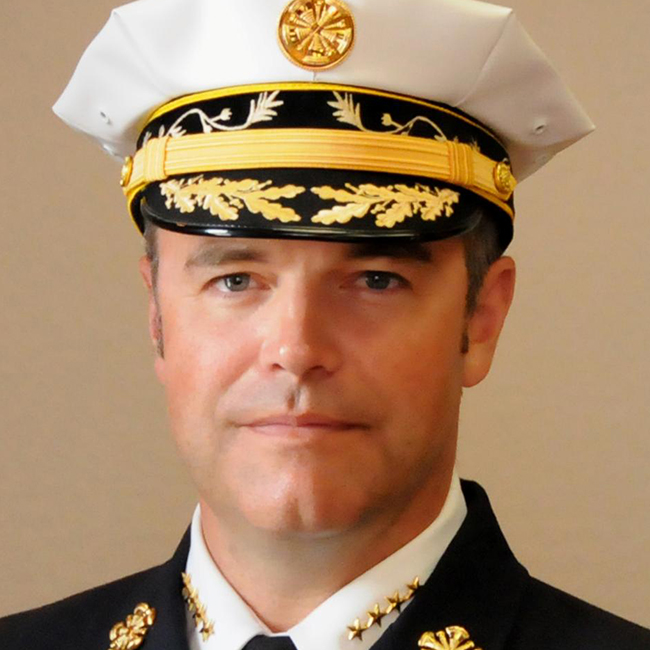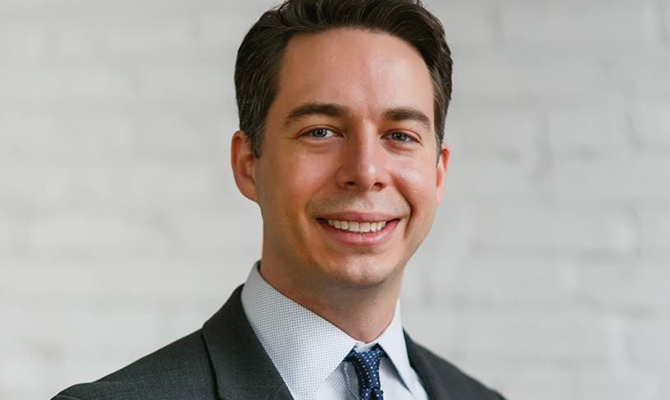
Managing Director, City of Philadelphia
Master of Philosophy in Organizational Dynamics, University of Pennsylvania `27—expected
Master of Science in Cities, The London School of Economics and Political Science `22
Master of Public Administration, George Mason University `00
Bachelor of Science in Fire Science, University of Maryland University College `04
Bachelor of Arts in History, University of North Carolina at Chapel Hill `94
When Adam Thiel (Master of Philosophy in Organizational Dynamics `27—expected) joined the Philadelphia Fire Department as the first non-Philadelphian Fire Commissioner since Benjamin Franklin, he wanted to spend his first few years immersed in the ins and outs of the city and its municipal organizations. Then he was ready to dedicate some time to educational pursuits. “I always need to be learning, or it’s like a piece of me is missing,” he explains. “And it’s important for me to be learning in a community that is supportive and diverse.” Emergency management is a 24/7 job—which Adam balances with his consulting work and time with his family—and Penn’s Master of Philosophy in Organizational Dynamics (MPhil) degree offered the flexibility to take classes on evenings and weekends, with some online or hybrid courses, to fit into his demanding schedule.
“Organizational dynamics is essentially what my job is in a fairly large mission-critical organization,” explains Adam. “Everything that we do at Fire and Emergency Services is a team sport. The women and men I have the privilege to work beside live and die as teams. That’s not hyperbolic,” he adds. “This is real-world stuff with real-world consequences. It’s important to me to stay up to date with the art and science of understanding teams—I owe that to the folks with whom I work.” As an MPhil student, Adam had the opportunity to take classes in group and team dynamics as well as systems and design thinking. His instructors have hailed from different academic and professional backgrounds, which was part of what attracted Adam to this program. “With Organizational Dynamics, there’s such a wide range of topics, and there’s always some kind of new or novel concept that’s being developed,” he says. “You have access to these truly multidisciplinary courses, faculty, colleagues, and you can also take electives from other schools in Penn, which I think is a huge benefit as well.”
Adam is no stranger to higher education; in addition to completing two previous master’s degrees and several executive education programs, he has pursued doctoral coursework in public administration and public policy and taught graduate courses for Georgetown University and George Mason University. He emphasizes that the City of Philadelphia does not supply tuition benefits for his degree; the cost-benefit analysis and decision to invest in education is his choice alone. Yet, Adam notes, although it is in no way a requirement, almost every senior staff member in his department is pursuing executive or graduate education. “I’m proud of that. Training and self-development are an important complement to experience,” he says. In addition, collaborating with Organizational Dynamics students of all ages and stages of their careers offers him a glimpse into the perspectives of Philadelphia residents from a wide range of backgrounds. “When I teach, I generally assign a team project, and everybody groans,” he laughs. “But some of the team projects that I’ve done in the Organizational Dynamics program have truly brought new and fresh insights to my day-to-day work.” For example, when Adam worked with classmates on a design thinking project about smoke alarm installation, their work yielded some insights that he was able to put into practice. “It’s incredibly valuable to hear the perspectives of folks who work in completely different industries,” he says.
While it is the journey, not the diploma, that satisfies Adam’s need for continued education, he does look forward to his eventual MPhil thesis. “I think it's going to be an opportunity for me to reflect on my leadership journey: explore what's important and what's not, develop some insights from research, and hopefully contribute something back to my own professional community,” he says. Reflection, he says, is a vital component of leadership practice—and one subtly reinforced during his time in the program so far. “Most of the classes I’ve taken have some sort of journaling or reflective practice embedded, regardless of subject matter,” he observes. “Just taking courses would not be enough. You have to integrate what you learn and practice in courses with real-world experience and other training opportunities.”
Reflecting on his journey so far, Adam advises his fellow students to look for opportunities to serve the city. “Coming to Philadelphia seven years ago, one of the best pieces of advice I got was to love the city and it will love you back,” he recalls. “I love Philadelphia—and being a part of the Penn community has been an important part of that experience for me. When folks look for capstone research or opportunities to put theory into action and make positive change, I hope they look right here.”
“And I hope you check your smoke alarms,” he adds.






